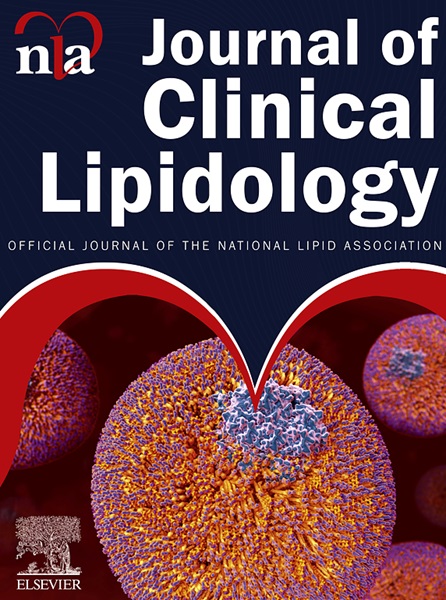Rapid lipid-lowering response in two cases of autosomal recessive hypercholesterolemia
IF 3.6
3区 医学
Q2 PHARMACOLOGY & PHARMACY
引用次数: 0
Abstract
BACKGROUND
Autosomal recessive hypercholesterolemia (ARH) is an ultrarare dyslipidemia caused by variants in the LDLRAP1 gene. Clinically, this condition is indistinguishable from other homozygous familial hypercholesterolemia (HoFH).
CASE
We present the cases of 2 siblings diagnosed with ARH caused by LDLRAP1 gene c.617-14C > A splicing homozygous variant. Over a 5-year treatment period, the older sibling experienced an 81% reduction in low-density lipoprotein cholesterol (LDL-C) levels with the maximal dose of pitavastatin plus ezetimibe, while the younger sibling achieved a 75% reduction. After three sessions, the older brother no longer required LDL apheresis, and the sibling never had LDL apheresis.
CONCLUSION
Our findings demonstrate a rapid and significant response to lipid-lowering therapy (LLT) in patients with ARH caused by c.617-14C > A splicing VUS variant, a condition that mimics HoFH at diagnosis. Long-term follow-up studies in large pediatric cohorts of ARH patients treated with pitavastatin plus ezetimibe from childhood are necessary to better define the risk of cardiovascular disease (CVD) development.
两例常染色体隐性高胆固醇血症患者的快速降脂反应。
背景:常染色体隐性高胆固醇血症(ARH常染色体隐性高胆固醇血症(ARH)是一种由 LDLRAP1 基因变异引起的超稀有血脂异常。在临床上,这种疾病与其他同型家族性高胆固醇血症(HoFH)没有区别:病例:我们报告了两兄妹因 LDLRAP1 基因 c.617-14C>A 拼接同源变异而被诊断为 ARH 的病例。在五年的治疗期间,哥哥服用最大剂量的匹伐他汀加依折麦布后,低密度脂蛋白胆固醇(LDL-C)水平降低了 81%,而弟弟则降低了 75%。三个疗程后,哥哥不再需要进行低密度脂蛋白清除术,而弟弟从未进行过低密度脂蛋白清除术:我们的研究结果表明,c.617-14C>A剪接VUS变异导致的ARH患者对降脂治疗(LLT)的反应迅速而显著,这种情况在诊断时与HoFH相似。为了更好地确定心血管疾病(CVD)的发病风险,有必要对从小就接受匹伐他汀加依折麦布治疗的大型儿科ARH患者队列进行长期随访研究。
本文章由计算机程序翻译,如有差异,请以英文原文为准。
求助全文
约1分钟内获得全文
求助全文
来源期刊
CiteScore
7.00
自引率
6.80%
发文量
209
审稿时长
49 days
期刊介绍:
Because the scope of clinical lipidology is broad, the topics addressed by the Journal are equally diverse. Typical articles explore lipidology as it is practiced in the treatment setting, recent developments in pharmacological research, reports of treatment and trials, case studies, the impact of lifestyle modification, and similar academic material of interest to the practitioner.
Sections of Journal of clinical lipidology will address pioneering studies and the clinicians who conduct them, case studies, ethical standards and conduct, professional guidance such as ATP and NCEP, editorial commentary, letters from readers, National Lipid Association (NLA) news and upcoming event information, as well as abstracts from the NLA annual scientific sessions and the scientific forums held by its chapters, when appropriate.

 求助内容:
求助内容: 应助结果提醒方式:
应助结果提醒方式:


